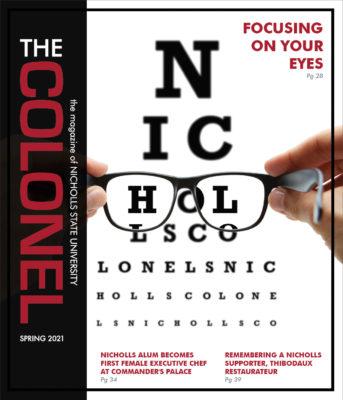
Our Venerable Tradition
“Tradition,” wrote Friedrich Nietzsche, “grows continually more venerable.” That’s easy to understand, but for the iconoclast Nietzsche it was a point of contention. He was deeply critical of traditions inherited by a community that define its morality and limit individual thinking. Nietzsche might be amused today to learn how traditions have changed so rapidly. Think of making friends versus friending, shopping versus delivery, downloads versus textbooks, on-line versus in-classroom learning—just to name a few things related to a campus community. While some changes are good, not all traditions need change. In fact, there’s one particular tradition in these parts that drives a good bit of community morality and thinking, and it’s a tradition in which the icon should never be clasted—at least until after it’s seasoned and boiled.
It was a balmy Sunday in the spring of 1974 when the tradition of Crawfish Day began at Nicholls. With the mass of heads and tails left behind annually for the nearly 50 years hence, future archaeologists and visiting aliens will have no trouble concluding what a grand tradition this was for our species. By now, we can boast that not only current students and their professors participate in the campus-wide mudbug meal, but also current professors and their professors have as well, including notable emeriti (shown above). On that first annual event, so many students showed up for the $1 all-you-can-eat extravaganza that both crawfish and beer, as well as multiple emergency replenishments, ran out quickly. While waiting long hours in line for a plate of crawfish—it being the 70s—students were momentarily entertained by a streaker (not shown).
And it was all fitting. Where else but in Louisiana where the two commercial crawfish species are the red swamp crawfish, which is typically reddish, and the white river crawfish, which is often grayish, can you find indigenous crustaceans that display the official colors of one of its universities? And with such a tradition, it should be no surprise that Nicholls was chosen as the site of this year’s official state Crawfish Pardoning, adjudicated by the Lieutenant Governor.
Of the first Crawfish Day, the Nicholls Worth—a tradition in itself—noted that the event served 2400 pounds of “crayfish”—using the Standard English term on behalf of their fellow students at Harvard Off-the-Bayou who may have been reading. “Crayfish” might be standard, but—really—who talks like that down here? I doubt seriously that Noah Webster ever attended a crawfish boil. Daniel Webster did, however, and he introduced some devilishly hot spices to the tradition—as one story goes. For those who insist on saying “crayfish,” however, we can all agree to get it out of our craw and forgive their cray. We good people like that.
Not lost on those who partake in our venerable tradition is the fundamental importance of crawfish to a university campus. Noted British scientist T.H. Huxley wrote an introductory college textbook in 1880, The Crayfish, basing a wealth of zoological concepts on the dissection and description of that one single animal. An even more venerable tradition, for more than a century after the book’s first publication both it and the animal remain standards of introductory laboratory instruction. In such instruction, a young scientist can learn the more esoteric terms for obscure crawfish body parts, like those pointy hind legs called “swimmerets.” Once at a backyard boil, I named all the crawfish legs, including swimmeret, for the guests. That scientific term apparently sounded a bit dainty and too much like the name of a dance team. Nonetheless, the event proved that a little education can go a long way: They must have all learned something new that day because, after several decades, I’ve not yet heard the end their amusement.
Before even Huxley’s time, crawfish were venerated here among the bayous. In the lore of multiple Indigenous Peoples, including the Houma, the Crawfish was supernaturally instructed to dive underwater and raise mud to form the land of primordial Earth. With the plethora of coastal problems we face in our region, maybe we should consider pardoning more crawfish to join us in the work of restoration and protection. Such a break in tradition might please Nietzsche but likely not Nicholls students. As one student in 1974 told the Nicholls Worth after the inaugural Crawfish Day, “It makes college worth coming to.”
– Dr. John P. Doucet
MORE COLONEL OF TRUTH


Our Venerable Tradition


Where we were, where we are, where we can be





